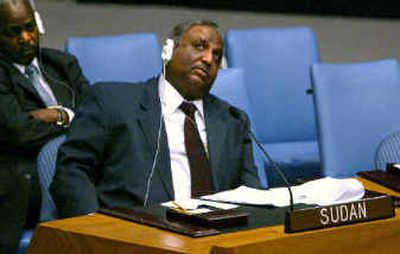Sudan warned to act against deadly militias

UNITED NATIONS – The U.N. Security Council adopted a U.S.-authored resolution Friday threatening the Sudanese government with sanctions if it does not rein in rampaging Arab militias within 30 days.
The resolution passed, 13-0, after the United States changed the language Thursday, dropping the term sanctions, to win over countries reluctant to back an explicit threat. At the same time, the resolution includes an implicit warning of penalties if the government does not cooperate.
Pakistan and China nonetheless abstained, saying that Khartoum, the Sudanese capital, needed more time to stop the attacks and that penalties might antagonize or destabilize the government. Sudanese officials, meanwhile, sharply criticized the measure and gave mixed signals about whether they would comply.
The resolution aims to give teeth to an agreement Khartoum signed with Secretary-General Kofi Annan in early July pledging to disarm Arab militias blamed for killing thousands of black African farmers, to protect the more than 1 million people who have been driven from their land by the attacks, and to help them return home safely.
“The resolution, in stern and unambiguous terms, puts the government of Sudan on notice that it must fulfill the commitments it made on July 3,” U.S. Ambassador John C. Danforth told the Security Council after the vote. “Sudan must know that serious measures – international sanctions – are looming, if the government refuses to do so.”
The conflict in Sudan’s western Darfur region began in February 2003, when the government-backed Arab militias known as “janjaweed” began to suppress an uprising by rebel groups who wanted a greater share of the nation’s oil wealth. The government is using the janjaweed to drive black villagers from their land and hand it to tribes loyal to Khartoum, exploiting a long-term territorial rivalry between Arab herdsman and largely black African farmers.
At least 30,000 people have died, and more than 1 million more displaced in a brutal and systematic campaign that the United Nations has called ethnic cleansing and the U.S. Congress branded as genocide.
The resolution demands that the Sudanese government round up and prosecute militia leaders, resume peace talks with the rebel groups, and guarantee access for relief groups that it has prevented from delivering aid, and allow international observers to monitor the cease-fire and human rights. It also imposes an arms embargo to cut off weapons to both the militias and the rebel groups.
Sudanese Ambassador Elfatih Mohamed Ahmed Erwa, speaking in the Security Council, lashed out at the United States, as well as African nations Algeria, Angola and Benin, which voted for the measure. He contended that the Sudanese government was making progress, and that the Bush administration was pushing the resolution to win votes during election season. Washington, D.C., he said, is using the crisis as an excuse to topple yet another Muslim government after “raining fire” on Afghanistan and Iraq.
U.N. officials agree there has been some progress by Sudan in the last month, especially regarding access for relief workers. In a marked change from June, the government has granted visas to aid agencies and allowed the delivery of food and medicine. But security and protection continues to be inadequate for displaced civilians, who continue to show up at temporary camps with tales of rape, mass murder and devastation of their villages by government gunships and janjaweed on horseback.